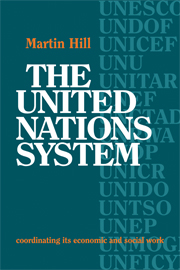Book contents
- Frontmatter
- Contents
- Foreword
- Preface
- Introduction
- Part I The problem of coordination and its setting
- Part II Some conclusions and suggestions
- Postscript
- 1 Abbreviations and glossary of institutions
- 2 Principal organs of the United Nations (General Assembly, Economic and Social Council and Secretariat) with main subsidiary organs directly concerned with economic and social cooperation and coordination (Status as of Spring 1976)
- 3 Chart of agencies related to the United Nations
- 4 Regional and branch offices of organizations of the United Nations System
- 5 Chart of the United Nations System
- 6 A new UN structure for global economic cooperation–list of conclusions and recommendations of the Group of Experts, prepared by the Secretariat
- Notes
- Index
2 - Principal organs of the United Nations (General Assembly, Economic and Social Council and Secretariat) with main subsidiary organs directly concerned with economic and social cooperation and coordination (Status as of Spring 1976)
Published online by Cambridge University Press: 05 November 2011
- Frontmatter
- Contents
- Foreword
- Preface
- Introduction
- Part I The problem of coordination and its setting
- Part II Some conclusions and suggestions
- Postscript
- 1 Abbreviations and glossary of institutions
- 2 Principal organs of the United Nations (General Assembly, Economic and Social Council and Secretariat) with main subsidiary organs directly concerned with economic and social cooperation and coordination (Status as of Spring 1976)
- 3 Chart of agencies related to the United Nations
- 4 Regional and branch offices of organizations of the United Nations System
- 5 Chart of the United Nations System
- 6 A new UN structure for global economic cooperation–list of conclusions and recommendations of the Group of Experts, prepared by the Secretariat
- Notes
- Index
Summary
GENERAL ASSEMBLY
(a) Organs of the General Assembly directly concerned with administrative and budgetary matters and whose reports are considered by the Assembly's Fifth Committee:
Advisory Committee on Administrative and Budgetary Questions–Consisting of 13 experts nominated by Governments and appointed by the General Assembly to assist the latter body in the discharge of its responsibility under Article 17 paragraph 1 of the Charter (consideration and approval of the budget of the organization) and paragraph 3 (consideration and approval of any financial and budgetary arrangements with the specialized agencies and examination of the agencies' administrative budgets).
Foint Inspection Unit–Consisting of 8 individuals, set up by the General Assembly Resolution 2150 (xxI) and reporting to the United Nations and the other Organizations participating in the ‘common system of salaries and allowances’. The Unit, administratively attached to the Secretary-General as chief administrative officer of the United Nations and as Chairman of the Administrative Committee on Coordination, has ‘the broadest powers of investigation in all matters having a bearing on the efficiency of the services and the proper use of funds’. The members are ‘chosen from among members of national supervision or inspection bodies, or from among persons of similar competence, on the basis of their special experience in national or international administrative and financial matters’.
- Type
- Chapter
- Information
- The United Nations SystemCoordinating its Economic and Social Work, pp. 177 - 189Publisher: Cambridge University PressPrint publication year: 1978



